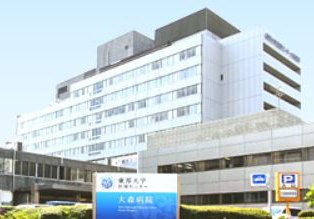Toho University Omori Medical Center


Established in:1925
Number of beds:934 beds(General Ward 898, Psychiatry Ward 36)
Number of operations:9,860 surgeries a year (as of FY2017)
Outpatients:2,321.8/day(as of FY2017)
This hospital was opened as an Imperial Women’s Medical College affiliated hospital in December 1925 (Taisho year 14) at a time when Japan was still reeling from the aftermath of the Great Kanto Earthquake. Although before the birth of Christ medical treatment was considered a magical act, Hippocrates thought of disease as a natural phenomenon and sought logical and scientific medical treatment through accumulation of experience and analogy. The invention of microscope in the 16th century enabled observation of things invisible to the naked eye, and this led to the discovery of bacteria in the 19th century. The year 1925, when Toho University was established, also marked the eve of vaccine development, start of insulin treatment, and development of penicillin. Discovery of specific etiology can be considered as epitomizing the age of supreme medical proposition. However, in cases where the pain is not alleviated even after the cause of disease has been removed, it has also become clear that disease onset may not occur even under the presence of known etiology. This university was established on the theme of “Nature, Life, Man” with the purpose of identifying the dilemma between scientific development and clinical medicine of the era, and sounding out alarm to the contradictions.
The philosophy of Omori Hospital is to “foster superior medical staff and promote research and development of advanced medical care, and provide warm-hearted, safe, and high quality community medical care to patients.” Thanks to the understanding of the community members, Omori Hospital, while providing advanced medical care in the capacity of an advanced treatment hospital, has also come to play the role of a core community hospital.
To make it easy to understand the specific department of medical examination under the present day proliferation of medical information, establishment of centers has been promoted since 2013. We have reorganized to meet the needs of everyone, whereby within the same center inpatient and outpatient treatments are now undertaken for diseases concerning heart, lung, kidney, and rheumatism. The general department of medicine now undertakes treatment where it is difficult to determine a specific department of examination for the disease.
The university is promoting team based treatment and is aiming to become a medical institution that accepts diversity with appropriate flexibility to handle individuality. I think that, the nurses who the patients perceive to be close to their hearts, will provide reassuring presence to everyone. The medical technologists are actively striving to maintain and manage measurement accuracy by incorporating latest testing methods, and have been rated as top runners in their field of specialization. The clinical engineers supporting advanced medical care are actively working in places such as hybrid operating rooms. The pathology department as the core of diagnosis, and the central division of diagnostic radiology in close collaboration with the respective clinical departments, both provide prompt and accurate diagnoses. The blood transfusion department, working round the clock, caters for emergency blood transfusions.
The general counseling department was established so that the practice of advanced medicine can lead to high level of satisfaction for everyone. Dedicated staff has been assigned to handle various questions and suggestions regarding concerns about treatment and medical care, examination counseling, and medical expenses.
The only pleasure after hospitalization is the meals. The staff in the nutrition department are doing their best in providing healthy and delicious food. The pharmaceutical department, not only serves as a center for preparation and supply of prescribed drugs, but also takes part as a member in the medical team, whereby its staff are stationed not only in the general medicine ward, but also in the emergency center, neonatal intensive care room, and outpatient chemotherapy room, thereby contributing to proper and safe drug therapy.
Although I do not have opportunities to meet everyone personally, I am well aware that there are many people who are supporting the operations of the hospital in the back office. The medical records management center is involved in quick introduction and personal information protection, the community collaboration department “Partners” are involved in smooth introduction, and the infection control department is working vigorously to prevent drug-resistant bacteria and spread of in-hospital infection. The clinical trial and research management department strives to ensure safety in conducting clinical trials and research with cooperation and understanding of everyone involved. We have also established a new high difficulty medical technology management department so that we can safely provide highly difficult advanced medical care.
To objectively evaluate the activities of this university, we actively undertake external evaluations. After obtaining certification of accreditation for Evaluation by function: General ward 2 [3rdG Ver.1.1] on April 1, 2016, five departments involved in clinical examinations (clinical examination department, pathology department, clinical physiological examination department, blood transfusion department, and drug testing laboratory) obtained ISO 15189 “Medical laboratories – Requirements for quality and competence” accreditation on March 15, 2017. To provide continuous and high quality medical care we are also focused on educating our students and trainee physicians, and Omori Hospital is certified as a graduate clinical training evaluation institution.
Basic Principles 1. We treat all those who seek medical care with upmost sincerity. 2. We practice safe and quality medicine. 3. We function as an emergency medical center. 4. We cooperate with local medical institutions and health organizations in the region. 5. We foster warm-hearted medical staff equipped with advanced medical techniques. 6. We practice advanced medicine based on ethics for medical practitioners.
